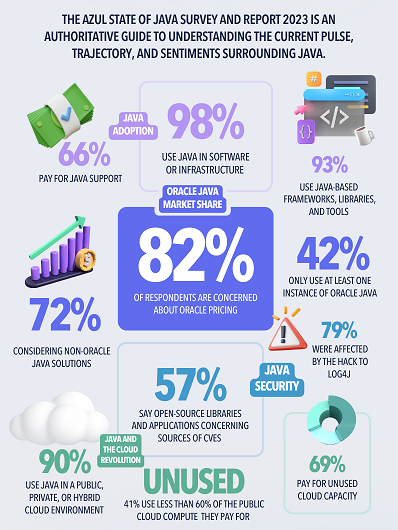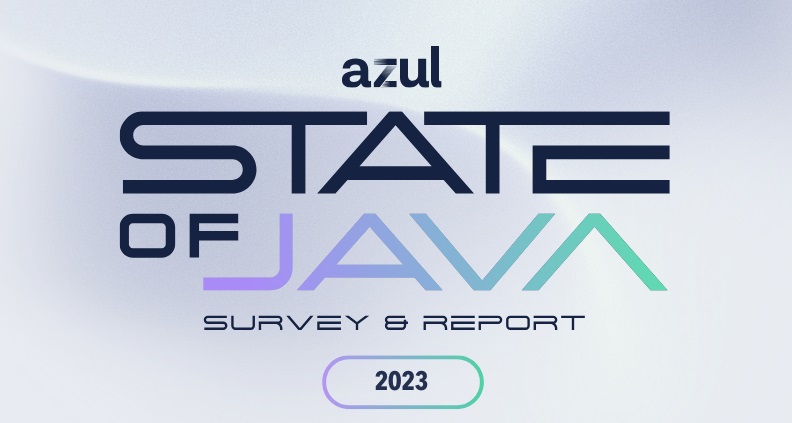SINGAPORE (October 31, 2023) – The first annual Azul State of Java Survey and Report 2023 was released recently, focusing on understanding the current trajectory surrounding Java, including sentiments among users about the price revisions and other changes introduced by the software development language.
The report was compiled based on responses gathered from over 2,000 Java users across the world, and tables keen insights on the importance of Java in today’s dynamic technological environment and its impact on all enterprises. An overwhelming 98% of respondents use Java in their IT infrastructure, while 57% stated that it is the backbone of the bulk of their applications, which include Java Virtual Machines (JVMs) and libraries.

More than 80% of organisations using Oracle Java have expressed concern about the recent changes that were done to the Java SE universal subscription pricing that was implemented in January of this year, which is the fourth major pricing change carried out in four years. The cost of Oracle Java was changed from being based on the number of processors used to the total number of employees and contractors in the company, resulting in 7 out of 10 (72%) of those polled saying they were now considering open-source alternatives such as OpenJDK. 14% said they did not realise that they actually had an option of using an alternative to Java.
Oracle maintains its strong presence in the Java market, with more than 40% of respondents stating that they still use at least one application of Oracle Java, 74% of organisations said that they use at least one instance of OpenJDK. Approximately 60% of companies have opted for OpenJDK today over Oracle Java SE.
“As with most universities, we are always looking for efficiency from our IT vendor relationships, not just by lowering costs, but also by eliminating uncertainty and distractions. Supporting so many departments and managing a wide range of vendor relationships means I can’t afford to worry about unexpected headaches such as price increases and audits,” said Emiliano Fisanotti, vendor management specialist and University Software Licensing Community executive member at The University of Sydney. “With Azul we found a trusted partner who was easy to work with and provided a secure, drop-in replacement for Oracle Java.”
Meanwhile, in a rapidly transforming cloud landscape, 90% of respondents say that they use a Java environment. Most organisations continue that progression on to the cloud in the interests of scalability, flexibility, productivity and agility. However, cost and security remain their major challenges, with more than 70% of respondents admitting that they are paying for cloud capacity that they are simply not utilising. This, along with a backdrop of volatile economic conditions, 95% of companies have taken steps to reduce their cloud costs in the past year. 46% of businesses are taking advantage of high-performance Java platforms to use their cloud resources more efficiently.
The ongoing threat of security vulnerabilities in Java applications is emphasised by a single compromised Java-based logging library (Log4j) , where almost 80% of respondents stated they have been affected by Log4Shell, which the Department of Homeland Security called “one of the most serious software vulnerabilities in history”. Nealy half of those affected had to spend additional time and resources to address this vulnerability while 30% were impacted by attempts to exploit the vulnerability.
“As the Azul State of Java Survey & Report data reveals, Java’s enduring prominence and role in enabling enterprises to thrive is undeniable, and high-performance JVMs are playing a pivotal role in meeting application service levels and cloud cost optimisation. The choices businesses make around Java directly impact their operational efficiency and the bottom line,” said Scott Sellers, co-founder and CEO at Azul. “Concerns raised over Oracle’s recent Java licensing and pricing changes also highlight a need for stability and trust in the technology partnerships that businesses form with their strategic vendors. Our sole focus is to champion this trust, ensuring that organisations of all sizes can continue to innovate, optimise and grow with the best Java solutions and strategies,” he added.

